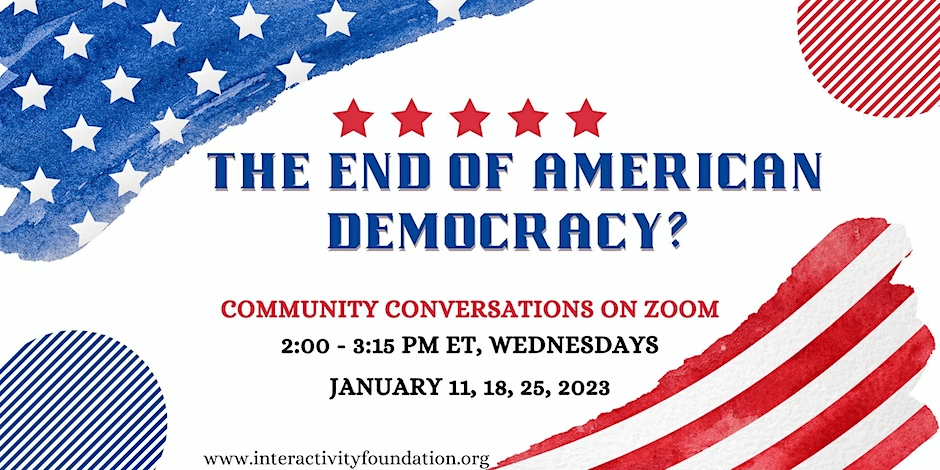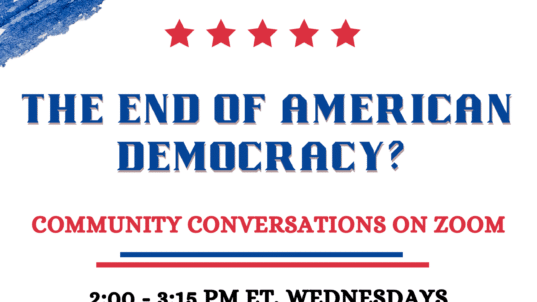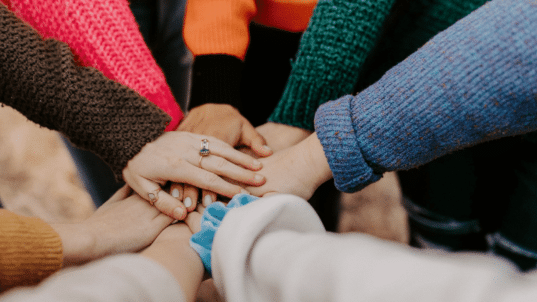
The End of American Democracy? Key Themes and Questions for Exploration
We started 2023 with a three-part community conversation series exploring what it might look like if democracy were to come to an end in the US. Our goal was to help the participants to work together to unearth some of the key areas for attention if our goal is to help democracy thrive rather than die. The following are some key themes and questions for exploration that emerged from those conversations on the threats to the health of American democracy. You can find longer summary notes from the first overview session, the second session on the mechanics of democracy, and the third session on the beliefs and values for a healthy democracy.
1. Democracy and the Targeting of “Outgroups”
Questions:
- Who belongs in American democracy?
- Who gets, or should get, to be a full participant in American democracy?
- How to best manage the consequences of unequal inclusion in American democracy?
In short: American democracy is weakened by the coordinated practice of both excluding certain groups of people from full inclusion in our democracy and of generating hostility against them as “outsiders” unworthy of equal status in our society. Key concerns are the way race, ethnicity, sex, gender, sexuality, immigration status, religion, etc. are used to exclude members of historically non-dominant groups from full and equal participation in our society. (Please join us for a free community conversation series on this topic, Who Are We the People–and Who are We Pushing Out?, which starts on October 20, 2023)
Key Themes: Outgroups, outsiders, equality, status, social hierarchies, demographic exclusion, marginalization, full and equal participation, pluralistic democracy
2. Democracy and Truth
Questions:
- How can we know and handle the truth?
- What roles should truth play in a healthy democracy —and how might we make this possible?
In short: American democracy is weakened by the proliferation of mis- and disinformation, by blocking the truthful encounter with history, by devaluing scientific inquiry, and by disavowing our capacity to know the truth. Key areas of concern centered on education (educating citizens with the values, skills, and knowledge necessary for a healthy democracy), science (the democratic need to have a testable and systematic way to grasp and understand reality), and the news media (the need to foster a well-informed citizenry for a healthy democracy). (We facilitated a separate community conversation series on Truth and Democracy. You can find summaries from the first session on the news media, the second on science, and the third on education).
Key Themes: Misinformation, disinformation, truth, education, science, media
3. Democracy and the Economy
Questions:
- What economic price are we willing to pay for a healthy democracy?
- What democratic price are we willing to pay for our economic system?
- What are the challenges for a healthy democracy presented by our economic system—and how might we manage these consequences?
In short: American democracy is weakened by rising economic inequality, rising economic insecurity, and the capture of policy-making by financial elites, which are consequences of our current economic system. These consequences in turn work to heighten the importance of our social hierarchies, amplifying social divisiveness. (We facilitated a separate community conversation series on The Economy and Democracy. You can find summaries from the first overview session, the second on the American Dream, and the third on reimagining the American Dream to be more supportive of a healthy democracy).
Key Themes: Economic inequality, economic system, hierarchy, divided, financial elites
4. The Core Norms and Values of Democracy
Questions:
- What are the norms and values essential for a healthy democracy?
- How do we grow and sustain these norms and values?
In short: American democracy is weakened by declining commitment to essential democratic norms and values such as equality (including equality before the law, and equal representation), freedom (including freedom of speech, freedom of belief, freedom to protest, the freedom of bodily autonomy, etc.), majority rule, protection of minorities, civility, non-violence, peaceful transfer of power, and much more.
Key Themes: Equality, equal representation, freedom, freedom of speech/belief/protest, bodily autonomy, majority rule, minority protection, civility, non-violence, peaceful transfer of power, the rule of law
5. The Workings of Democracy
Questions:
- What are the institutions and processes we need for a healthy democracy, and how can they best embody essential democratic norms and values?
- How can we create democratic institutions and processes that operate in a fair and equitable way and that are responsive to the greater good of the population, rather than catering to private special interests?
In short: American democracy is weakened by the failure of essential institutions and mechanisms of governance to embody and uphold essential democratic norms and values. Key areas of concern include voter suppression and unequal access to participation in the democratic process, gerrymandering and unequal representation, the financial capture of policy making, anti-majoritarian institutions (the Senate, the filibuster, the Electoral College), and the judiciary (especially the Supreme Court, acting as an unchecked partisan power and stripping fundamental rights from the people).
Key Themes: Governance, institutions, voter suppression, unequal access, equal participation, minority rule, judiciary, Electoral College, filibuster, gerrymandering, unequal representation, rights
6. Democracy and Violence
Questions:
- How might we address the root causes of violence and create new norms for a nonviolent, peaceful democracy?
- How does the upsurge of violence relate to the failure of our democratic norms and values and the failure of our democratic institutions to work for the greater good?
In short: American democracy is weakened by the use and threat of violence, whether the political embrace of violence (politicians posing with guns, extra-legal militia movements and paramilitary forces), the use of state violence in policing (most often used against non-White populations or those protesting for greater equality), and criminal violence (especially evidenced in our rising rates of gun violence).
Key Themes: Violence, threat of violence, endorsement of violence, non-violence, gun violence, paramilitary, police/state violence, protest, non-White, militias, politicians



